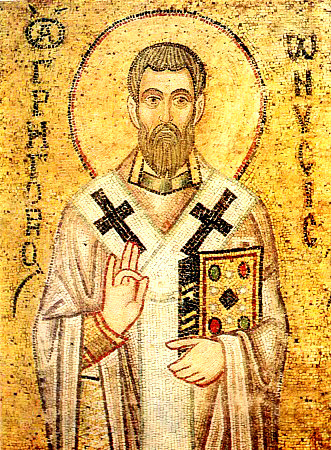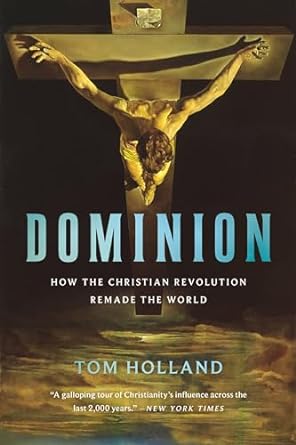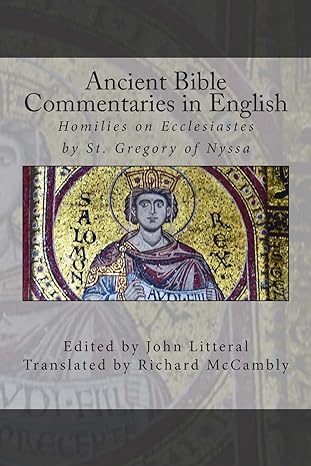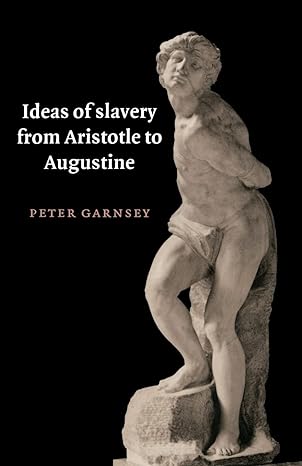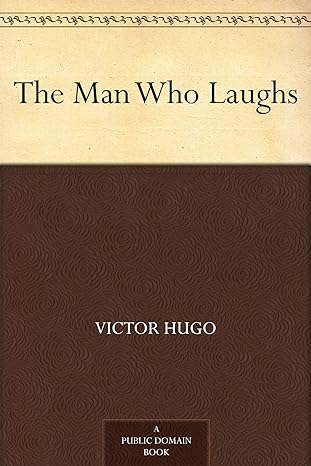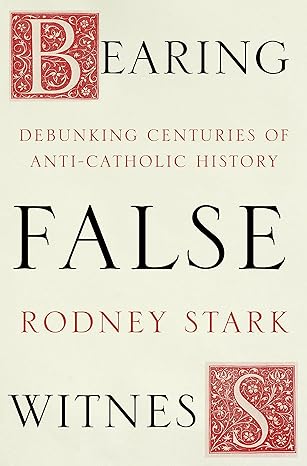We cannot judge the past with current values. A man from the ancient word was a product of his time. Thus, it is unfair to classify as “evil people” great thinkers like Aristotle and Seneca because they, like all their contemporaries, did not questioned the institution of slavery.
Nonetheless, important to, trough the lessons of British historian Tom Holland in his book “Dominion”, remember some brutish aspects of Antiquity. The Spartan practiced a type of eugenics, the Greeks were licensed to rape their conquered as a reward for their acts, the Romans sexually abused their slaves (including children!), the Persians created terrible torture techniques, and among all of them there was two terrible common things: vast acceptance of infanticide and a firm rejection any intrinsic value of the poor, the weak and the oppressed.
Obviously, this does not mean that those abhorrent crimes did not happen in the Christian era. However, there is a key difference: those were seen as reprehensible by society and its thinkers, while the ancient not only did not see any moral objections, but also encouraged such malefic behaviors. This led the aforementioned British Historian, even though an agnostic, to recognize that his own values and those of western society came distinctly from Christianity.
On slavery, it is crucial to understand that it was a central part of economy and see as something normal and inevitable. At most, some talked about giving better living conditions to slaves, but its extinction was not even considered. Similar scenario is found in the Bible itself. There are passages suggesting a good treatment to those enslaved, however, despite Saint Paul’s words (“There is neither Jew nor Gentile, neither slave nor free, nor is there male and female, for you are all one in Christ Jesus”, Galatians 3:28), and Christ’s command to love thy neighbor as thyself, that would inspire the modern abolitionist movement, there is not explicit condemnation of slavery In any biblical book.
In this ancient world that arises Gregory of Nyssa, influential theologian (especially in regard to the the Trinity) and revered as a saint by the Catholic, Orthodox and Anglican Churches. From a wealthy family, he was born in 335 A.D., at an already Christian Roman Empire, at the Province of Cappadocia (located today at Turkey). Married and a Professor of Rhetoric, he later in life decided to follow the monastic life, common in his family: his mother Emmelia of Casesarea, and four of his brothers, St. Macrina the Younger, St. Naucratius, St. Peter of Sebaste and St. Basil of Caesarea, are all also considered Saints. He was heavily influenced by Basil (the oldest brother) and Macrina on dedicating his life to the poor. The first-born son was responsible for the creation of the Basileias (later named as such), almost like cities to those in need, that gathered shelters and what many consider to be the first ever Hospital.
Gregory became Bishop of the town of Nissa, also located at Cappadocia. According to Tom Holland, he not only criticized, like his older brother, the difference between the poor and the rich, but also the institution of slavery itself (the first known thinker to do so). In his “Homilies on Ecclesiastes”, he wrote the following passages (I’ve typed “note” between parenthesis to explain some relevant information):
Ecclesiastes 2:7 –
I got me slaves and slave-girls,
and homebred slaves were born for me,
and much property in cattle and sheep became mine,
above all who had been,
before me in Jerusalem.334.5. We still find the occasion for confession controlling the argument. The one who gives an account of his doings relates one after another almost all the things through which the futility of the activities of this life is recognized. But now he reaches as it were a more serious indictment of things he has done, as a result of which one is accused of the feeling of Pride. For what is such a gross example of arrogance in the matters enumerated above — an opulent house. and an abundance of vines, and ripeness in vegetable-plots, and collecting waters in pools and channelling them in gardens — as for a human being to think himself the master of his own kind? I got me slaves and slave-girls, he says, and homebred slaves were born for me.
Do you notice the enormity of the boast? This kind of language is raised up as a challenge to God. For we hear from prophecy that all things are the slaves of the power that transcends all (Ps 119/118,91). So, when someone [p335] turns the property of God into his own property and arrogates dominion to his own kind, so as to think himself the owner of men and women, what is he doing but overstepping his own nature through pride, regarding himself as something different from his subordinates?
335,5. I got me slaves and slave-girls. What do you mean? You condemn man to slavery, when his nature is free and possesses free will, and you legislate in competition with God, overturning his law for the human species. The one made on the specific terms that he should be the owner of the earth, and appointed to government by the Creator – him you bring under the yoke of slavery, as though defying and fighting against the divine decree.
335,11. You have forgotten the limits of your authority, and that your rule is confined to control over things without reason. For it says Let them rule over winged creatures and fishes and four-footed things and creeping things (Gen, 1,26). Why do you go beyond what is subject to you and raise yourself up against the very species which is free, counting your own kind on a level with four-footed things and even footless things? You have subjected all things to man, declares the word through the prophecy, and in the text it lists the things subject, cattle and oxen and sheep (Ps 8,7- 8). Surely [p336] human beings have not been produced from your cattle? Surely cows have not conceived human stock? Irrational beasts are the only slaves of mankind. But to you these things are of small account. Raising fodder for the cattle, and green plants for the slaves of men, it says (Ps 104, 14). But by dividing the human species in two with ‘slavery’ and ‘ownership’ you have caused it to be enslaved to itself, and to be the owner of itself.
336,6. I got me slaves and slave-girls. For what price, tell me? What did you find in existence worth as much as this human nature? What price did you put on rationality? How many obols did you reckon the equivalent of the likeness of God? How many staters (note: coin used in Ancient Greece) did you get for selling the being shaped by God? God said, Let us make man in our own image and likeness (Gen 1,26). If he is in the likeness of God, and rules the whole earth, and has been granted authority over everything on earth from God, who is his buyer, tell me? who is his seller? To God alone belongs this power; or rather, not even to God himself. For his gracious gifts, it says, are irrevocable (Rom 11,29). God would not therefore reduce the human race to slavery, since he himself, when we had been enslaved to sin, spontaneously recalled us to freedom. But if God does not enslave what is free, who is he that sets his own power above God’s?
336,20. How too shall the ruler of the whole earth and all earthly things be put up for sale? [p337] For the property of the person sold is bound to be sold with him, too. So how much do we think the whole earth is worth? And how much all the things on the earth (Gen 1,26)? If they are priceless, what price is the one above them worth, tell me? Though you were to say the whole world, even so you have not found the price he is worth (Mat 16,26; Mk 8,36). He (note: Christ) who knew the nature of mankind rightly said that the whole world was not worth giving in exchange for a human soul. Whenever a human being is for sale, therefore, nothing less than the owner of the earth is led into the sale-room. Presumably, then, the property belonging to him is up for auction too. That means the earth, the islands, the sea, and all that is in them. What will the buyer pay, and what will the vendor accept, considering how much property is entailed in the deal?
337,13. But has the scrap of paper, and the written contract, and the counting out of obols deceived you into thinking yourself the master of the image of God? What folly! If the contract were lost, if the writing were eaten away by worms, if a drop of water should somehow seep in and obliterate it, what guarantee have you of their slavery? what have you to sustain your title as owner? I see no superiority over the subordinate [p338] accruing to you from the title other than the mere title. What does this power contribute to you as a person? not longevity, nor beauty, nor good health, nor superiority in virtue. Your origin is from the same ancestors, your life is of the same kind, sufferings of soul and body prevail alike over you who own him and over the one who is subject to your ownership – pains and pleasures, merriment and distress, sorrows and delights, rages and terrors, sickness and death. Is there any difference in these things between the slave and his owner? Do they not draw in the same air as they breathe? Do they not see the sun in the same way? Do they not alike sustain their being by consuming food? Is not the arrangement of their guts the same? Are not the two one dust after death? Is there not one judgment for them? a common Kingdom, and a common Gehenna (note: biblical term analogous to hell)?
338,14. If you are equal in all these ways, therefore, in what respect have you something extra, tell me, that you who are human think yourself the master of a human being, and say, I got me slaves and slave-girls, like herds of goats or pigs. For when he said, I got me slaves and slave-girls, he added that abundance in flocks of sheep and cattle came to him. For he says, and much property in cattle and sheep became mine, as though both cattle and slaves were subject to his authority to an equal degree.
About those significant and inspiring words, British historian Peter Garnsey (in “Ideas of slavery from Aristotle to Augustine”. Oxford, 1996, p. 243), stated that they are, as summed up by Brazilian Bruno S. Gripp in an introduction to the translation of the one of Nissa works (called “Comentário ao Pai Nosso”, Editora Paideusis. Fontes Cristãs, 2018): “the most vehement denouncement of slavery until the arise of the abolitionist movement in the modern era” (free translation) — such movement only began to blossom in the 18th century, since previous attempts to forbid acts of slavery did not result in its real abolition for all, nor did it change the zeitgeist; for example, Papal Bulls condemning slavery were mostly ignored[1] (please, do not forget to read the two footnotes at the end of this post!).
It is likewise relevant to mention what was written about those passages by David Bentley Hart, philosopher, theologian and biblical scholar:
Nowhere in the literary remains of antiquity is there another document quite comparable to Gregory of Nyssa’s fourth homily on the book of Ecclesiastes: certainly no other ancient text still known to us—Christian, Jewish, or Pagan—contains so fierce, unequivocal, and indignant a condemnation of the institution of slavery. Not that it constitutes a particularly lengthy treatise: it is only a part of the sermon itself, a brief exegedeal excursus on Ecclesiastes 2:7 (‘I got me male and female slaves, and had my home-born slaves as well’), but it is a passage of remarkable rhetorical intensity. In it Gregory treats slavery not as a luxury that should be indulged in only temperately (as might an Epicurean), nor as a necessary domestic economy too often abused by arrogant or brutal slave-owners (as might a Stoic like Seneca or a Christian like John Chrysostom), but as intrinsically sinful, opposed to God’s actions in creation, salvation, and the church, and essentially incompatible with the Gospel. (…) Gregory lived at a time, after all, when the response of Christian theologians to slavery ranged from—at best—resigned acceptance to — at worst — vigorous advocacy. But, then, this makes all the more perplexing the question of how one is to account for Gregory’s eccentricity. Various influences on his thinking could of course be cited— most notably, perhaps, that of his revered teacher and sister Macrina, who had prevailed upon Gregory’s mother to live a common life with her servants—but this could at best help to explain only Gregory’s general distaste for the institution; it would still not account for the sheer uncompromising vehemence of his denunciations.
Unfortunately, in a Society that had its economy dominated by the slavery, those inspired words from Gregory of Nissa did not reverberate among his peers, nor in many centuries to come…
Close to the end of this article, I have remembered a passage from the great book “The man who laughs” by French Master Victor Hugo:
By friction gold loses every year a fourteen hundredth part of its bulk. This is what is called the Wear. Hence it follows that on fourteen hundred millions of gold in circulation throughout the world, one million is lost annually. This million dissolves into dust, flies away, floats about, is reduced to atoms, charges, drugs, weighs down consciences, amalgamates with the souls of the rich whom it renders proud, and with those of the poor whom it renders brutish.
Maybe Nyssa words did not get lost in time. Perhaps they did not dissolve, but flew away, floated in time and, slowly, weighed down the consciences of men, awakening them for the only possible conclusion about slavery: an evil and indefensible institution, “the most atrocious cruelty” (as written by the great Brazilian sociologist Darcy Ribeiro (Footnote 2), that must be permanently banned from our world.
[1] As an example of this absence of practical effects, it is important to mention Rodney Stark (late PHD and professor of sociology and compared religions) in the book “Baring False Witness”. After commenting on the Papal Bull Sublimis Deus, promulgated by Pope Paul III in 1537 (that expressly considered the indigenous people — and all the people to be later “discovered” — rational beings, and forbade their slavery, he states:
In a second bull on slavery, Paul imposed the penalty of excommunication on anyone, regardless of their “dignity, state, condition, or grade who may in any way presume to reduce said Indians to slavery or despoil their goods.” But nothing happened. Soon, in addition to the brutal exploitation of the Indians, Spanish and Portuguese slave ships began to sail between Africa and the New World. And just as overseas Catholic missionaries had aroused Rome to condemn enslavement of Indians, similar appeals filed concerning imported black slaves. On April 22, 1639, Pope were Urban VIII (1623-44), at the request of the Jesuits of Paraguay, issued a bull Commissum nobis reaffirming the rule by “our predecessor Paul III” that those who reduced others to slavery were subject to excommunication.” Eventually, the Congregation of the Holy Office (the Roman Inquisition) took up the matter. On March 20, 1686, it ruled in the form of questions and answers:
It is asked:
Whether it is permitted to and deceit Blacks capture by force and other natives who have harmed no one? Answer: no.
Whether it is permitted to buy, sell or make contracts in their respect Blacks and other natives who have harmed no one and been made captives by force or deceit? Answer: no.
Whether the possessors of Blacks and other natives who have harmed no one and been captured by force or deceit, are not held to set them free? Answer: yes.
Whether the captors, buyers and possessors of Blacks and other natives who have harmed no one and who have been captured by force or deceit are not held to make compensation to them? Answer: yes.
Nothing ambiguous here. The problem wasn’t that the Church failed to condemn slavery; it was that few heard it and most did not listen. In this era, popes had little or no influence over the Spanish or the Portuguese since at that time the Spanish ruled most of Italy; in 1527, under the leadership of Charles V, they had even sacked Rome. If the pope had little influence in Spain or Portugal, he had next to none in their New World colonies, except indirectly through the work of the religious orders. In fact, it was illegal even to publish papal decrees “in the royal consent,’ and the king also appointed all the bishops.
Nevertheless, Urban VIII’s bull was read in public by the Jesuits in Rio de Janeiro, with the result that rioters attacked the local Jesuit College and injured a number of priests. In Santos, a mob trampled the Jesuit vicar-general when he tried to publish the bull, and the Jesuits were expelled from São Paulo when word spread of the involvement in obtaining the bull.
Despite of what was written by Stark, I must say that this does not exempt the Catholic Church members and, mainly, its leadership of not have adopted a much more active role in the struggle for those bulls to have real effectiveness. Thus, especially regarding the Brazilian catholic clergy, it is essential to expose an opposite view presented by Joaquim Nabuco, unforgettable Brazilian abolitionist, in the celebrated book “O Abolicionista” (written in 1883, free translation by me):
In other countries, the emancipation propaganda was a religious movement, preached from the pulpit, held with fervor by different churches and religious communions. Among us, the abolitionist movement nothing owns, unfortunately, to the Church of the State; on the contrary, the possession of men and women by convents and by all secular clergy entirely demoralized the religious sentiment of masters and slaves. These saw the priesthood as just a man who could by them, and those looked at slaves as the last person who would remember to accuse them. The desertion, by our clergy, of the role designed for them by the Gospels, was as shameful as possible: nobody saw them stand for the slaves, use religion to soften the captivity, and to state the moral truth to the masters. No priest has ever tried to prevent a slave auction, nor has condemned the religious regime of the slave quarters. The Catholic Church, despite its great power in a country in big part still fanaticized by it, has never elevated its voice in favor of emancipation in Brazil.
If of what gives strength to abolitionism is not mainly the religious sentiment, which is not the level of progress it could be, by being denatured by its own clergy, it is also not the spirit of charity and philanthropy. The war against slavery was, in England, a religious and philanthropic movement, determined by sentiments anything but political, except in the sense in which morality can be called politics.
2. In “The Brazilian People: The Formation and Meaning of Brazil”, the Brazilian sociologist Darcy Ribeiro wrote one of the most haunting and touching texts about the tragic effects slavery had in Brazil (note: I own the Brazilian version and have translated this passage myself):
No people who went through this as a life routine, throughout centuries, would get out from it without being indelibly marked. All of us, Brazilians, are flesh from the flesh of those tortured blacks and indigenous people. All of us Brazilians are, likewise, the possessed hand that tortured them. The most tender sweetness and the most atrocious cruelty conjugated here to make us the heartfelt and suffering people we are, and the insensitive and brutal people we also are.
Descendants from slaves and slave masters, we will always be servants of the malignancy distilled and installed in us, just as through the painful feeling intentionally produced to hurt even more, as well as through practicing brutality over men, over women, over children converted in pasture of our rage.
The most terrible of our heritages is always caring with us the torturer’s scar impressed in the soul and ready to explode into racist and classist brutality. That is what burns, to this day, in much Brazilian authority, predisposed to torture, batter and hurt the poor who fall in their hands. It, however, provoking increasing indignation will give us the strength, tomorrow, to contain the possessed and create a solidary society.
